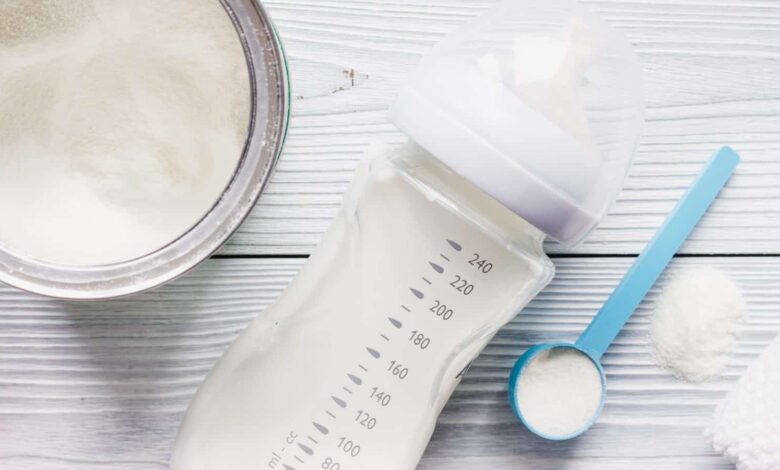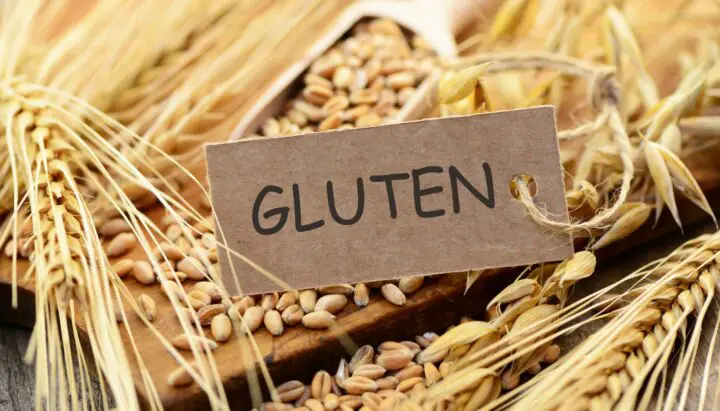Does Baby Formula Contain Gluten?

Choosing an infant formula when there is a family history of gluten intolerance or celiac disease can be a worrisome process. With the possibility that it contains gluten always at the forefront, finding the perfect nutrition may take a little time and research.
The good news is most baby formulas do not contain gluten. Click here for a popular gluten-free baby formula option. In fact, if you look at the product label of most infant formulas, you won’t see gluten ingredients listed. The bad news is there is always a possibility of cross-contamination in production.
What Ingredients are Gluten?

Gluten is the general name for the proteins found in wheat, rye, barley, and triticale. These proteins help foods maintain their shape, acting as a glfue that holds food together.
For products that contain gluten ingredients, the FDA Food Allergen Labeling Law requires manufacturing companies to warn consumers of the possible allergen. The statement “contains wheat” will be found at the end of the ingredient list on packaged foods for safety.
Gluten Allergy in Babies

Caregivers staying abreast of the latest information on gluten may wonder if your little baby has an allergy or sensitivity.
A good place to begin may be to think of a gluten allergy as a wheat allergy, since it is the predominant cause of the allergic reactions. For the first months, unless gluten is specifically listed on your infant nutrition, it will be difficult to know if your baby has a wheat allergy.
There is some speculation that breastfed babies may experience wheat allergy symptoms sooner from the mother’s breast milk, but no scientific evidence supports this.
If necessary, you can have an allergy test for babies to identify if your baby has a true wheat allergy. The allergy test for babies at least helps a parent narrow down what is causing problems in their baby and provides data to make decisions from in the future.
Gluten Allergy Symptoms in Babies
As much as 6 percent of the population may have a non-celiac gluten sensitivity. By cutting or severely limiting gluten to little ones when there is a sensitivity, babies feel better in a short amount of time. Gluten sensitivity signs to look for:
- Vomiting
- Diarrhea
- Upset Stomach
- Rashes (hives/eczema)
Celiac Disease in Babies
Less than 1% of the babies in the United States will have a severe reaction to gluten that will cause an autoimmune response. Symptoms of celiac disease in infants include:
- Failure to thrive, including a failure to gain weight or even weight loss
- Swollen stomach
- Diarrhea
- Constipation
- Irritability
- Fatigue
- Rashes (hives/eczema)
- Bloating
Prevention
Especially if there is a family history of intolerance or sensitivity, it is best to try to prevent allergies by avoiding wheat and other gluten products until your baby is at least one year old.
Even though most baby formulas are gluten-free, it means that parents who are gluten-intolerant or are concerned about their baby will need to be diligent when selecting a baby formula with the purest ingredients.
What ingredients should I look for in baby formula?
So now that we have discussed gluten in baby formula, you might be wondering what ingredients are important for baby formula. Of course the essential nutrients are set at a minimum standard both in the US and Europe, but there are some extra “goodies” that parents might want to consider, especially if they have a more sensitive baby.
1. DHA/ARA

First up, check for DHA/ARA in the baby formula. If you are purchasing your formula from Europe, this ingredient is mandatory based on their most recent regulations from 2024. In America, unfortunately they have not made it a mandatory ingredient, and many formulas do not add it.
It’s important to consider where the DHA is sourced from as well. For example, some DHA is created synthetically in a lab, whereas other DHA is derived from fish oil. Obviously, the more natural the DHA, the healthier it will be for your baby. Be cautious about the fish oil derived DHA as well, since they use hexane to extract the DHA from the fish oil. In the EU the ensure there are no remnants left of this toxic chemical in the DHA used for their baby formula, but there are no such regulations in place for American formulas.
One other thought on this, if you are a vegetarian family, you may want to find DHA that is sourced from the Algae. There are some brands in Europe, like Kendamil, that use this vegetarian friendly DHA. Another positive note is that hexane is never used for the extraction of DHA from the algae!
2. Prebiotics/Probiotics
Next, you might want to consider prebiotics and probiotics in your baby formula. Since your baby’s tummy and digestive system are not fully developed, they might need the extra help of prebiotics or probiotics.
These wonderful ingredients help babies further digest their foods and break them down. In return, the milk moves quicker through the digestive track and creates less gas and upset tummy for the baby. Plus, it has been shown to help reduce spit-up issues in babies, because they don’t have the milk just sitting in their tummy to spit up for long.
Consider once again what the source is of these prebiotics and probiotics. Some brands will have natural prebiotics from the lactose, especially in whole milk versions of formula. Probiotics are typically the strain of Lactobacillus, which is a healthy bacterium. Breastfed babies have a high level of the good bacteria already from the breastmilk they receive, so they are able to combat the bad bacteria more easily than formula-fed babies.
3. HMOs (Human Milk Oligosaccharides)

This is a more recently discovered “goodie” ingredient for baby formula. This natural ingredient is the third most abundant ingredient in breastmilk, so having it in your baby formula is a definite plus. HMOs mostly help with immune health in babies because they help the good bacteria flourish. Furthermore, HMOs support brain development and cognitive functions in your growing baby.
When searching for HMO in baby formula, try to find an organic version. This will eliminate it from having any toxic chemicals attached to the extraction/creation of the HMO used.
Conclusion
Parents who understand the discomfort of gluten intolerance or celiac disease do not want their little one to have those same issues. Finding the perfect nutrition for your baby starts with ingredients that you trust to be safe, pure, and allergen free. With a little bit of research, finding the perfect nutrition is one click away.
